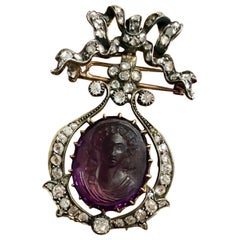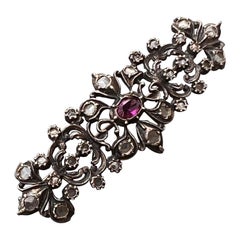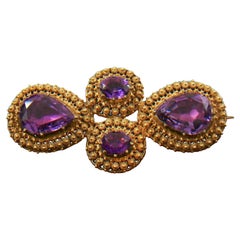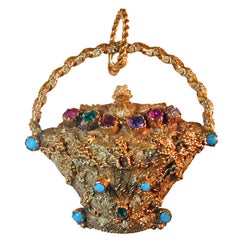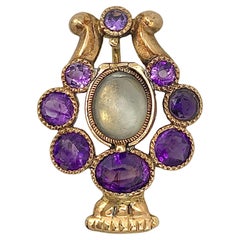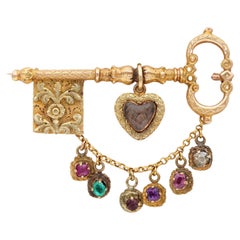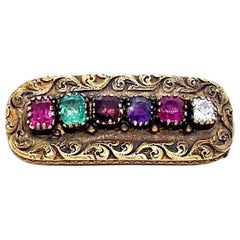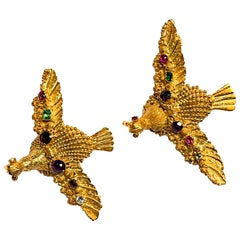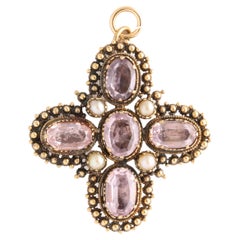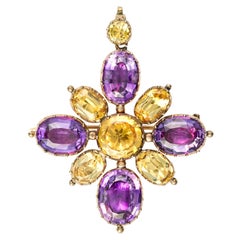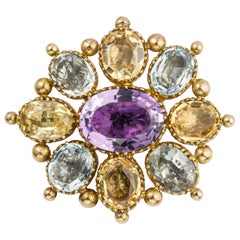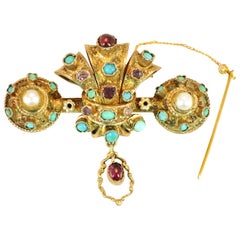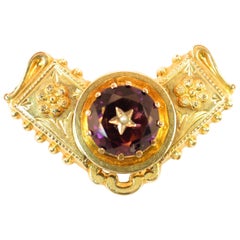Georgian Amethyst Brooch
Antique Mid-18th Century Georgian Brooches
Amethyst, Diamond, 18k Gold
Antique Late 18th Century European Georgian Brooches
Amethyst, Sapphire, Silver
Antique Early 19th Century French Georgian Brooches
Amethyst, 18k Gold, Yellow Gold
Antique Early 19th Century English Georgian Brooches
Amethyst, Diamond, Emerald, Garnet, Ruby, Turquoise, Multi-gemstone, 18k...
Antique 1820s English George III Brooches
Amethyst, Gold, 14k Gold
Antique Early 19th Century British Georgian Brooches
Amethyst, Diamond, Emerald, Garnet, Ruby, 18k Gold
Antique 1820s British Georgian Brooches
Amethyst, Ruby, Garnet, Emerald, Diamond, 18k Gold, Gold, Yellow Gold
Antique Early 19th Century English Georgian Brooches
Amethyst, Diamond, Emerald, Garnet, Ruby, 14k Gold, 15k Gold
Antique Early 19th Century British Georgian Brooches
Amethyst, Citrine, 18k Gold
Antique 1820s European George III Pendant Necklaces
Amethyst, Pearl, Gold, 18k Gold
Antique Early 19th Century British George III Brooches
Amethyst, Topaz, Gold, Yellow Gold
Antique Early 19th Century British George IV Brooches
Amethyst, Aquamarine, Citrine, Gold, Yellow Gold
Recent Sales
Antique 1840s Georgian Brooches
Amethyst, Garnet, Pearl, Turquoise, 10k Gold
Antique 1830s Georgian Brooches
10k Gold
Antique Early 1800s British Georgian Brooches
Amethyst, Diamond, Emerald, Garnet, 18k Gold
Antique Early 19th Century Unknown Georgian Brooches
Amethyst, Diamond, White Diamond, 18k Gold, Sterling Silver
Antique Early 19th Century Georgian Brooches
Amethyst, Gold
Antique 1820s Georgian Brooches
Amethyst, Diamond, Emerald, Garnet, Pearl, Ruby, Pinchbeck
Antique 1830s Georgian Brooches
Diamond, Pearl, Ruby, Topaz, Turquoise, Citrine, Onyx, Amethyst, Chrysop...
Antique 1820s French Georgian Pendant Necklaces
Amethyst, Citrine, Diamond, Gold, 18k Gold
Antique 1770s Portuguese Georgian Brooches
Amethyst, Topaz, Imperial Topaz, Silver
Antique 1760s Portuguese Georgian Pendant Necklaces
Amethyst, Topaz, Gold, 18k Gold, 22k Gold, Yellow Gold
Antique 1780s British Georgian Brooches
Amethyst, Diamond, 14k Gold, 9k Gold, Yellow Gold, Silver
Antique Early 19th Century British Georgian Brooches
Pearl, Gold
Antique Early 19th Century English Georgian Brooches
Amethyst, 15k Gold
Antique Early 19th Century Georgian Brooches
Amethyst, Ruby, Gold, 18k Gold, Yellow Gold
Antique 19th Century English Georgian Brooches
Amethyst, Silver
Antique 1820s British Georgian Brooches
Amethyst, Aquamarine, Citrine, Garnet, 9k Gold
Antique Early 19th Century English Georgian Brooches
Amethyst, White Diamond, Emerald, Garnet, Ruby, 15k Gold
Antique Early 19th Century English Georgian Jewelry & Watches
Amethyst, 15k Gold
Antique 1750s British Brooches
Amethyst, Citrine, Garnet, Rock Crystal, 18k Gold
People Also Browsed
Antique Late 18th Century Portuguese Georgian Chandelier Earrings
Diamond, Sterling Silver
Antique Late 18th Century French Georgian Engagement Rings
18k Gold, Yellow Gold
Antique 1820s Unknown Georgian Pendant Necklaces
Diamond, Pearl, Silver
Antique Late 18th Century Portuguese Georgian Cluster Rings
Rock Crystal, 15k Gold
1860s French Hats
Antique Late 18th Century Spanish Georgian Chandelier Earrings
Diamond, Emerald, 18k Gold, Silver
1950s French Evening Gowns
Antique 1890s English Victorian Cocktail Rings
Diamond, Moonstone, 9k Gold, Silver
1930s Belgian Formal Wear
Antique Mid-19th Century Victorian Brooches
Diamond, 14k Gold
Antique Late 19th Century British Victorian Brooches
Diamond, Natural Pearl, Ruby, Yellow Gold
1820s British Day Dresses
1810s French Empire Waist Dresses
Antique 1780s European Georgian Signet Rings
Agate, Garnet, Gold
21st Century and Contemporary Italian Baroque More Jewelry
Diamond, Pearl, Gold, White Gold
Antique 1760s Spanish Georgian Pendant Necklaces
Pearl, Diamond, Gold, Silver
Georgian Amethyst Brooch For Sale on 1stDibs
How Much is a Georgian Amethyst Brooch?
Why Gold Shines in Jewelry Craftsmanship
Gold is the feel-good metal, the serotonin of jewelry. Wear vintage and antique gold necklaces, watches, gold bracelets or gold rings and you feel happy, you feel dressed, you feel, well, yourself.
Gold, especially yellow gold, with its rich patina and ancient pedigree going back thousands of years, is the steady standby, the well-mannered metal of choice. Any discussion of this lustrous metal comes down to a basic truth: Gold is elementary, my dear. Gold jewelry that couples the mystique of the metal with superb design and craftsmanship achieves the status of an enduring classic. Many luxury houses have given us some of our most treasured and lasting examples of gold jewelry over the years.
Since its founding, in 1837, Tiffany & Co. has built its reputation on its company jewelry as well as its coterie of boutique designers, which has included Jean Schlumberger, Donald Claflin, Angela Cummings and Elsa Peretti. There are numerous gold Tiffany classics worth citing. Some are accented with gemstones, but all stand out for their design and the workmanship displayed.
For the woman who prefers a minimalist look, the Tiffany & Co. twist bangle (thin, slightly ovoid) is stylishly simple. For Cummings devotees, signature pieces feature hard stone inlay, such as her pairs of gold ear clips inlaid with black jade (a play on the classic Chanel black and tan), or bangles whose design recalls ocean waves, with undulating lines of lapis lazuli and mother-of-pearl. And just about any design by the great Jean Schlumberger is by definition a classic.
Even had he eschewed stones and diamonds, Southern-born David Webb would be hailed for the vast arsenal of heavy gold jewelry he designed. Gold, usually hammered or textured in some manner, defines great David Webb jewelry. The self-taught jeweler made very au courant pieces while drawing inspiration from ancient and out-of-the-way sources — East meets West in the commanding gold necklaces made by Webb in the early 1970s. The same could be said for his endlessly varied gold cuffs.
In Europe, many houses have given us gold jewelry that sets the highest standard for excellence, pieces that were highly sought after when they were made and continue to be so.
Numerous designs from Cartier are homages to gold. There are the classic Trinity rings, necklaces and bracelets — trifectas of yellow, white and rose gold. As a testament to the power of love, consider the endurance of the Cartier Love bracelet.
Aldo Cipullo, Cartier’s top in-house designer from the late 1960s into the early ’70s, made history in 1969 with the Love bracelet. Cipullo frequently said that the Love bracelet was born of a sleepless night contemplating a love affair gone wrong and his realization that “the only remnants he possessed of the romance were memories.” He distilled the urge to keep a loved one close into a slim 18-karat gold bangle.
BVLGARI and its coin jewelry, gemme nummarie, hit the jackpot when the line launched in the 1960s. The line has been perennially popular. BVLGARI coin jewelry features ancient Greek and Roman coins embedded in striking gold mounts, usually hung on thick link necklaces of varying lengths. In the 1970s, BVLGARI introduced the Tubogas line, most often made in yellow gold. The Tubogas watches are classics, and then there is the Serpenti, the house's outstanding snake-themed watches and bracelets.
A collection called Monete that incorporated the gold coins is one of several iconic BVLGARI lines that debuted in the 1970s and ’80s, catering to a new generation of empowered women. Just as designers like Halston and Yves Saint Laurent were popularizing fuss-free ready-to-wear fashion for women on the go, BVLGARI offered jewels to be lived in.
Since Van Cleef & Arpels opened its Place Vendôme doors in 1906, collection after collection of jewelry classics have enchanted the public. As predominantly expressed in a honeycomb of gold, there is the Ludo watch and accessories, circa the 1920s, and the golden Zip necklace, 1951, whose ingenious transformation of the traditional zipper was originally proposed by the Duchess of Windsor. Van Cleef's Alhambra, with its Moroccan motif, was introduced in 1968 and from the start its popularity pivoted on royalty and celebrity status. It remains one of VCA’s most popular and collected styles.
Mention must be made of Buccellati, whose name is synonymous with gold so finely spun that it suggests tapestry. The house’s many gold bracelets, typically embellished with a few or many diamonds, signified taste and distinction and are always in favor on the secondary market. Other important mid-20th-century houses known for their gold-themed jewelry include Hermès and Ilias Lalaounis.
Find a stunning collection of vintage and antique gold jewelry on 1stDibs.
The Legacy of Amethyst in Jewelry Design
There are few gemstones in the world that are both affordable and worthy of a duchess’s attention. But then not many stones are as beautiful as amethyst. Indeed, vintage and antique amethyst jewelry has innumerable fans, and February’s birthstone has many unique attributes. For the romantics, there are several tales in Greek mythology that tell the story of Bacchus and Amethyste, a maiden that he pursues yet is rescued by Diane by turning her into a white stone. Bacchus, mourning his love, pours a glass of wine over the sculpture, dyeing her purple.
Amethyst has adorned many royal jewels. One of the most enviable jewelry collections of all time belonged to Wallis Simpson, the Duchess of Windsor. In 1947, the Duke gifted her with a Cartier amethyst and turquoise bib necklace. This special order piece was made with twisted 18-carat and 20-carat gold, platinum, brilliant- and baguette-cut diamonds, one heart-shaped faceted amethyst, 27 emerald-cut amethysts, one oval faceted amethyst, and turquoise cabochons. The Duchess was not the only Royal with a penchant for the purple gemstone. The tiara now owned by Queen Silvia of Sweden is set with amethysts that once belonged to the French Empress Josephine. A stunning 56-carat cushion-cut, square-shaped amethyst set in an 18-karat yellow gold necklace designed by Tiffany & Co. is now in the collection of the Smithsonian National Museum of Natural History.
The Smithsonian also has in its possession an even more rare example of fine amethyst: the 96-carat Morris Amethyst Brooch. The brooch features a deep, rich purple heart-shaped amethyst. The museum states that the piece was likely made during the Edwardian period (1901–15) “when platinum and diamonds were often used, and amethyst, a favorite stone of King Edward VII’s wife, Alexandra, was often included in jewelry of the era.”
Another amethyst necklace, with an even richer story, can be found in the Natural History Museum of London. Known as the Delhi Purple Sapphire (even though the stone is an amethyst), this stone was stolen from the Temple of Indra during the Indian Mutiny of 1857. Anyone in possession of this stone is bound to have terrible luck, including its owner Edward Heron-Allen, who gifted the gemstone to the museum thinking that this would save him but ended up transferring the bad luck to the museum curators overseeing the stone.
Find a wide range of vintage and antique amethyst necklaces, bracelets and other fine jewelry on 1stDibs.
